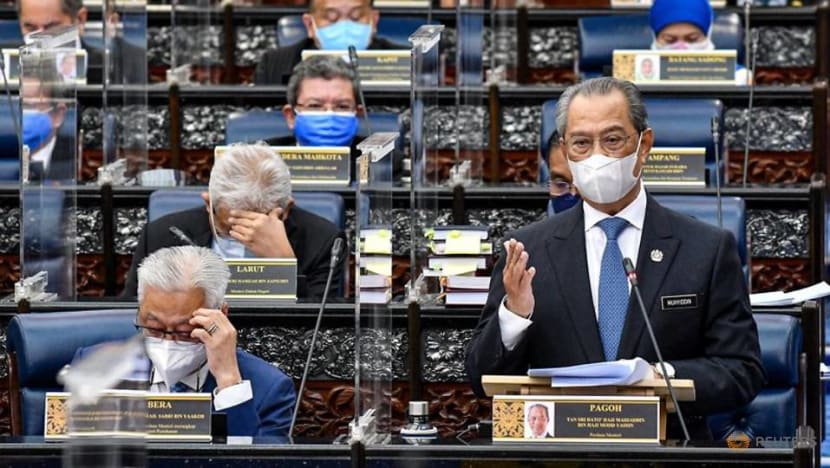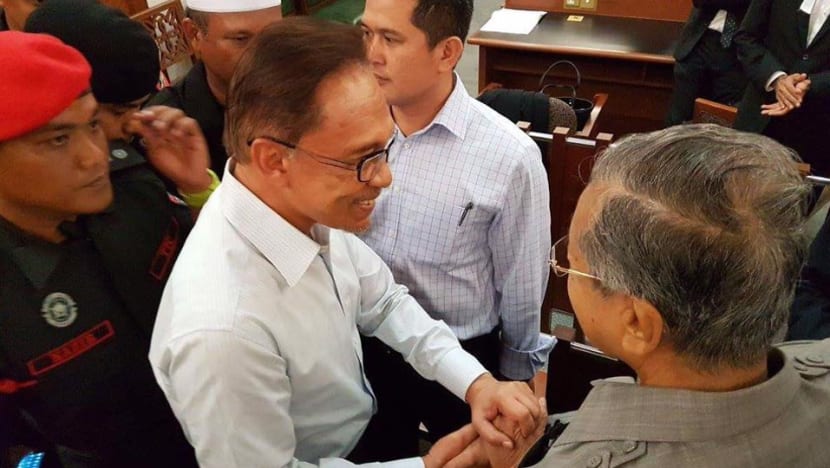Commentary: This political impasse in Malaysia is a calm before the storm
Should a motion of confidence in PM Muhyiddin Yassin succeed, the Opposition might still attempt a defeat of 2022 Budget, says Tricia Yeoh.

Malaysia's Prime Minister Muhyiddin Yassin, in Kuala Lumpur, Malaysia July 26, 2021. (Photo: Reuters/Malaysia Information Department)
KUALA LUMPUR: Events over the last week have deepened Malaysia’s political crisis.
Prime Minister Muhyiddin Yassin’s already questionable majority was publicly challenged when an UMNO minister resigned and the party announced the withdrawal of 11 of its Members of Parliament.
This followed a special Parliamentary sitting, in which it was revealed the Cabinet wanted – but failed – to revoke the Emergency Ordinances, resulting in tense public exchanges between the prime minister and the king about whether royal consent was required, unprecedented in a constitutional monarchy like Malaysia.
Despite UMNO’s withdrawal from the Perikatan Nasional coalition, Muhyiddin’s government is still in place for several reasons.
First, Malaysia’s federal constitution does not recognise political parties, and stipulates that only the king shall appoint as prime minister a Member of the House of Representatives (lower house of Parliament) whom he believes commands the confidence of the majority in the Lower House.
Second, there are only three ways in which any one parliamentarian’s majority can be tested: Through a general election, a vote of confidence (or no confidence) in Parliament, or through evidence submitted directly to the king, for example statutory declarations affirmed by members of the Lower House, as was the case that paved the way for Muhyiddin’s assumption of the top office in February 2020.
THE OPPOSITION MUST DECIDE ON A LEADER FOR PM
The record surge of COVID-19 infections in Malaysia has given Muhyiddin an out. For public health reasons, he can fend off calls for a parliamentary motion of confidence earlier than his announced September session.
That at least 11 COVID-19 cases were reported in Parliament last week bolsters the public impression that lawmakers meeting when a pandemic is raging can be risky, despite the fact that all parliamentarians already have been vaccinated and hence parliamentary sessions can actually be held safely with the appropriate restrictions in place.
But this doesn’t render the Opposition – which now claims to hold the majority – inert. In fact, opposition MPs have three options at its disposal.
First, they can lobby the Agong, for he can advise the government for another special parliamentary sitting to be held sooner rather than later in September.
Second, if Parliament is not brought forward, the Opposition has one month to strategise and plan for the September sitting.
Doing well entails for the motion of confidence to be submitted to the Speaker Azhar Azizan and any necessary procedure according to parliamentary standing orders to be strictly adhered to so that the Speaker has no procedural grounds for rejection.
Apart from a motion of no confidence in PM Muhyiddin, like the one Opposition leader Anwar Ibrahim submitted in late July thrown out on the grounds it was “too early”, the Opposition must also ensure it also submits motion(s) of confidence in a Member of Parliament it is prepared to support as prime minister, whether Anwar Ibrahim or otherwise.
In such a scenario, it is possible that parliamentarians from UMNO will support Anwar. However, the Opposition must also be aware of potential parliamentarians from its side of the bench who may not necessarily vote in favour of the selected candidate.
Apart from Anwar, the other likely candidate is former Prime Minister Mahathir Mohamed. But he is unlikely to command the favour of PKR, given how dynamics between Anwar and Mahathir was what precisely ignited the political crisis of February 2020 in the first place.

If both motions are successful, the power vacuum would be filled and the position of prime minister and the government would be determined. But these steps will require detailed planning and careful coordination.
WOULD OPPOSITION VOTE DOWN THE 2022 BUDGET?
Third, if the Opposition is unsuccessful in unseating Muhyiddin Yassin as Prime Minister in September, there is still one remaining opportunity this calendar year, when the 2022 Budget must be tabled in October.
Attempts last October to defeat the 2021 Budget failed after the government launched a campaign to lobby for support, with the king also urging politicians from both sides of the aisle to unite behind the goal of safeguarding economic recovery and people’s well-being.
It will be very politically unpalatable for the Opposition to oppose the Budget when livelihoods and businesses are at stake, but this seems like the final opportunity this year for the Opposition to demonstrate that Muhyiddin no longer controls the majority of the House.
However, the Opposition could also vote down the Budget on the grounds that it disagrees with certain allocations, and if played well, could reverse this sentiment.
(Parliament is scheduled to sit between Oct 25 to Dec 16 to debate the Budget.)
Malaysians in Kuala Lumpur, Johor Bahru and Kota Kinabalu reveal how they are coping with these realities, after nine months of fighting the deadly pandemic.
The problem is the longer the political impasse drags on, the more time there is for parties and political leaders to entice, cajole and persuade individual parliamentarians over to their respective sides.
In the Sabah state election campaign, the Pakatan Harapan had claimed that as much as RM32 million (US$7.6 million) was offered to each state assemblyman to defect.
Settling the question about political leadership and bringing forward the vote of confidence as soon as possible would reduce the window for such dealings.
However, that decision lies solely in the hands of the prime minister. We also cannot rule out further backdoor dealings even after one side has won the prime minister’s office.
PLAYING THE INCUMBENCY CARD
Prime Minister Muhyiddin Yassin continues to have the upper hand at present, if only because of the power of incumbency. Notwithstanding any plans the Opposition might have, there are still steps that Muhyiddin can take to shore up his position.
If he plays his cards right, he could still steer things in his favour and even maintain a minority government if no other parliamentarian possesses the confidence of a majority.
The Opposition’s uphill climb to build a consensus on a PM candidate may even help Muhyiddin. The longer they take to coalesce around a single leader, the better for Muhyiddin.
After all, it’s really up to him and the Speaker of Parliament to allow a motion of confidence in Parliament.
Alternatively, Muhyiddin might also decide to tie the motion of confidence with the tabling of the 2022 Budget, upping the stakes and tying his fate to the popular desire for more government aid.
It would be extremely challenging, given the economic circumstances and the need for government to approve and distribute additional aid, for the Opposition to be seen blocking the Budget.
Muhyiddin could also engineer a confidence and supply agreement (CSA) with political parties like the Democratic Action Party (DAP) to win favour, taking a leaf from UMNO’s playbook.
In Perak, UMNO managed to secure sufficient support to oust the Bersatu Chief Minister in December 2020 in a no-confidence motion after providing constituency development funds to opposition state assemblypersons in exchange for support, and subsequently had one of its representatives assume the role.
Providing lucrative constituency development funds to opposition Members of Parliament can be attractive at this stage when politicians are increasingly depended upon to provide cash and food aid to hungry and pandemic-struck constituents.
Finally, Muhyiddin could capitalise on government institutions to discredit opposition leaders in the public eye, for example, putting pressure on the Malaysian Anti-Corruption Commission to fast-track investigations of corruption.
Already Syed Saddiq, founder and sole MUDA parliamentarian has been charged on Thursday (Aug 5) with two counts of corruption which he pled not guilty to. Opposition MPs who attempted to enter Parliament last Monday are also being investigated by the police under the Penal Code and Peaceful Assembly Act.
Unless the impasse is resolved quickly, Malaysia’s national outlook will be plagued by the consequences of political instability, as a pandemic continues to ravage the country.
A final note, however, is that whichever political coalition comes to power will likely function with a small majority. We have witnessed the end of dominant party politics and both Malaysian politicians and society will have to adapt and react likewise.
Tricia Yeoh is CEO of the Institute for Democracy and Economic Affairs.



















